An Analysis of Social Factors in Nursing's Historical Evolution
VerifiedAdded on 2020/04/29
|6
|1216
|34
Essay
AI Summary
This essay examines the social factors that have significantly shaped the evolution of the nursing profession. Beginning with its roots as an intuitive response to care for the sick, the essay traces the development of nursing from ancient practices, where sickness was attributed to evil spirits, through the influence of Greek emphasis on personal health and the establishment of early hospitals in the Roman Empire. It details the role of women as caregivers and the impact of the Renaissance, the Elizabethan Poor Law, and the Industrial Revolution on the profession's growth, leading to the establishment of nursing schools and the recognition of nurses' role in healthcare. The essay highlights the pivotal contributions of Florence Nightingale, the impact of the Great Depression and the World Wars, and the influence of healthcare reforms and insurance plans. It emphasizes the shift from diploma programs to baccalaureate degrees and the licensure of nurses. The essay concludes by underscoring how wars, economic changes, and influential leaders have transformed nursing principles over time, reflecting societal changes and advancements in healthcare.
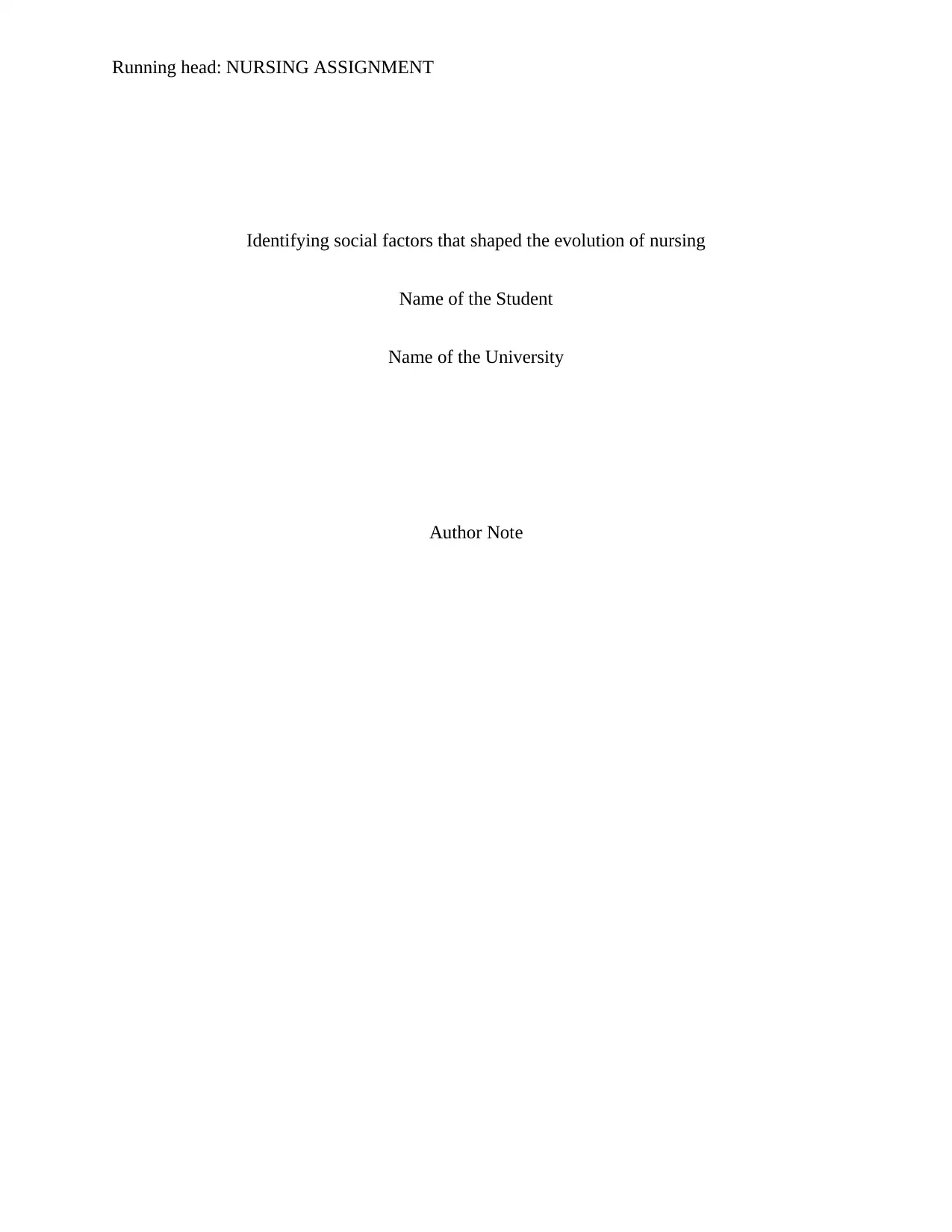
Running head: NURSING ASSIGNMENT
Identifying social factors that shaped the evolution of nursing
Name of the Student
Name of the University
Author Note
Identifying social factors that shaped the evolution of nursing
Name of the Student
Name of the University
Author Note
Paraphrase This Document
Need a fresh take? Get an instant paraphrase of this document with our AI Paraphraser
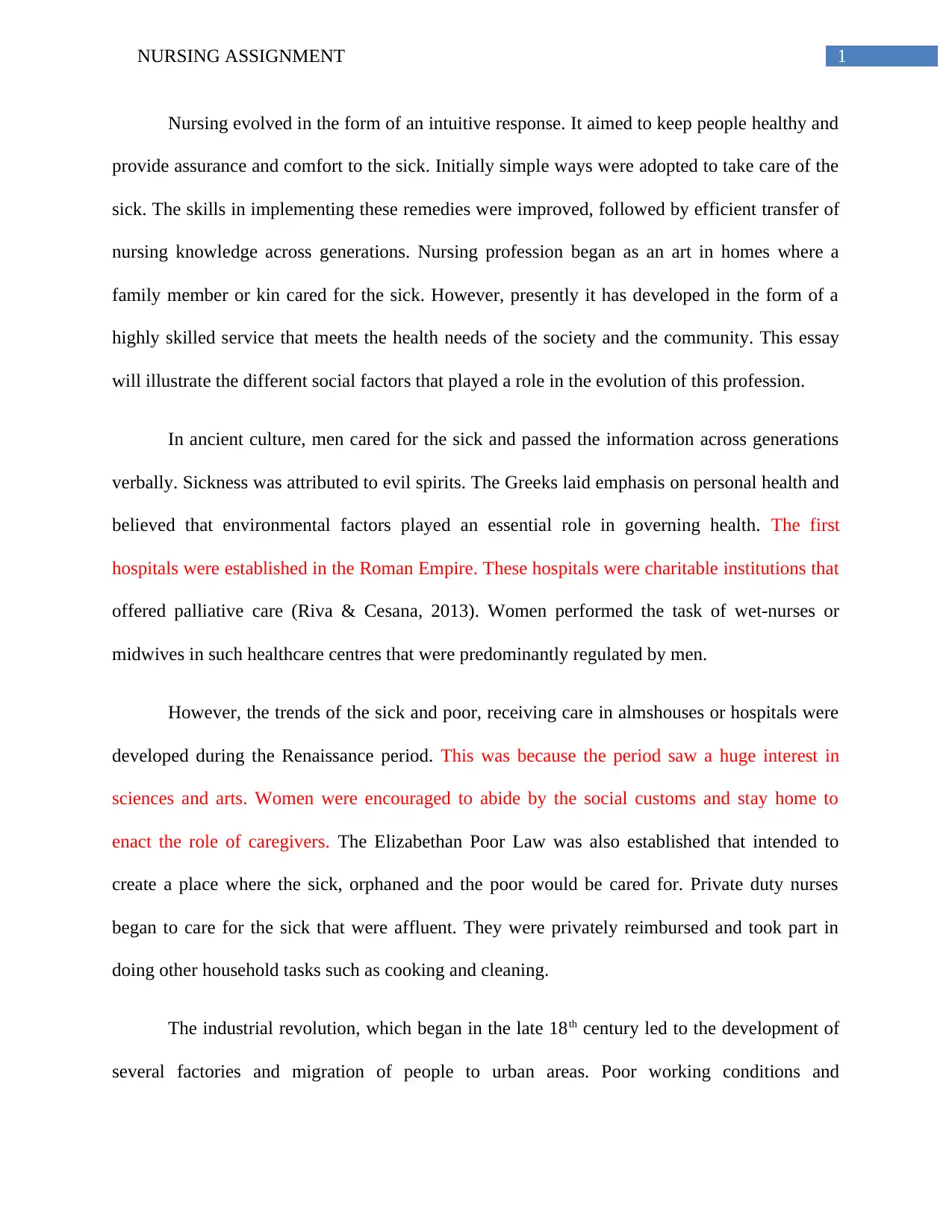
1NURSING ASSIGNMENT
Nursing evolved in the form of an intuitive response. It aimed to keep people healthy and
provide assurance and comfort to the sick. Initially simple ways were adopted to take care of the
sick. The skills in implementing these remedies were improved, followed by efficient transfer of
nursing knowledge across generations. Nursing profession began as an art in homes where a
family member or kin cared for the sick. However, presently it has developed in the form of a
highly skilled service that meets the health needs of the society and the community. This essay
will illustrate the different social factors that played a role in the evolution of this profession.
In ancient culture, men cared for the sick and passed the information across generations
verbally. Sickness was attributed to evil spirits. The Greeks laid emphasis on personal health and
believed that environmental factors played an essential role in governing health. The first
hospitals were established in the Roman Empire. These hospitals were charitable institutions that
offered palliative care (Riva & Cesana, 2013). Women performed the task of wet-nurses or
midwives in such healthcare centres that were predominantly regulated by men.
However, the trends of the sick and poor, receiving care in almshouses or hospitals were
developed during the Renaissance period. This was because the period saw a huge interest in
sciences and arts. Women were encouraged to abide by the social customs and stay home to
enact the role of caregivers. The Elizabethan Poor Law was also established that intended to
create a place where the sick, orphaned and the poor would be cared for. Private duty nurses
began to care for the sick that were affluent. They were privately reimbursed and took part in
doing other household tasks such as cooking and cleaning.
The industrial revolution, which began in the late 18th century led to the development of
several factories and migration of people to urban areas. Poor working conditions and
Nursing evolved in the form of an intuitive response. It aimed to keep people healthy and
provide assurance and comfort to the sick. Initially simple ways were adopted to take care of the
sick. The skills in implementing these remedies were improved, followed by efficient transfer of
nursing knowledge across generations. Nursing profession began as an art in homes where a
family member or kin cared for the sick. However, presently it has developed in the form of a
highly skilled service that meets the health needs of the society and the community. This essay
will illustrate the different social factors that played a role in the evolution of this profession.
In ancient culture, men cared for the sick and passed the information across generations
verbally. Sickness was attributed to evil spirits. The Greeks laid emphasis on personal health and
believed that environmental factors played an essential role in governing health. The first
hospitals were established in the Roman Empire. These hospitals were charitable institutions that
offered palliative care (Riva & Cesana, 2013). Women performed the task of wet-nurses or
midwives in such healthcare centres that were predominantly regulated by men.
However, the trends of the sick and poor, receiving care in almshouses or hospitals were
developed during the Renaissance period. This was because the period saw a huge interest in
sciences and arts. Women were encouraged to abide by the social customs and stay home to
enact the role of caregivers. The Elizabethan Poor Law was also established that intended to
create a place where the sick, orphaned and the poor would be cared for. Private duty nurses
began to care for the sick that were affluent. They were privately reimbursed and took part in
doing other household tasks such as cooking and cleaning.
The industrial revolution, which began in the late 18th century led to the development of
several factories and migration of people to urban areas. Poor working conditions and
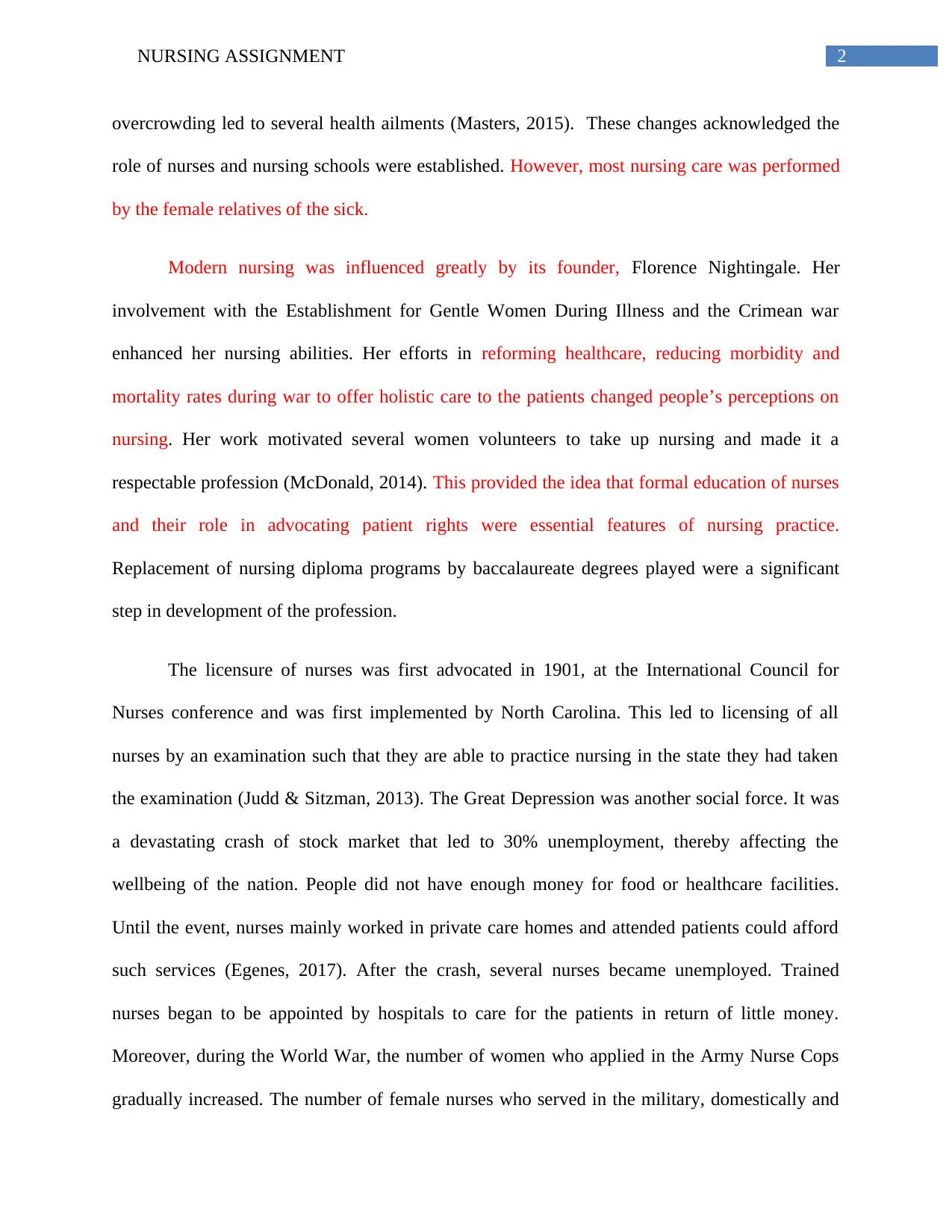
2NURSING ASSIGNMENT
overcrowding led to several health ailments (Masters, 2015). These changes acknowledged the
role of nurses and nursing schools were established. However, most nursing care was performed
by the female relatives of the sick.
Modern nursing was influenced greatly by its founder, Florence Nightingale. Her
involvement with the Establishment for Gentle Women During Illness and the Crimean war
enhanced her nursing abilities. Her efforts in reforming healthcare, reducing morbidity and
mortality rates during war to offer holistic care to the patients changed people’s perceptions on
nursing. Her work motivated several women volunteers to take up nursing and made it a
respectable profession (McDonald, 2014). This provided the idea that formal education of nurses
and their role in advocating patient rights were essential features of nursing practice.
Replacement of nursing diploma programs by baccalaureate degrees played were a significant
step in development of the profession.
The licensure of nurses was first advocated in 1901, at the International Council for
Nurses conference and was first implemented by North Carolina. This led to licensing of all
nurses by an examination such that they are able to practice nursing in the state they had taken
the examination (Judd & Sitzman, 2013). The Great Depression was another social force. It was
a devastating crash of stock market that led to 30% unemployment, thereby affecting the
wellbeing of the nation. People did not have enough money for food or healthcare facilities.
Until the event, nurses mainly worked in private care homes and attended patients could afford
such services (Egenes, 2017). After the crash, several nurses became unemployed. Trained
nurses began to be appointed by hospitals to care for the patients in return of little money.
Moreover, during the World War, the number of women who applied in the Army Nurse Cops
gradually increased. The number of female nurses who served in the military, domestically and
overcrowding led to several health ailments (Masters, 2015). These changes acknowledged the
role of nurses and nursing schools were established. However, most nursing care was performed
by the female relatives of the sick.
Modern nursing was influenced greatly by its founder, Florence Nightingale. Her
involvement with the Establishment for Gentle Women During Illness and the Crimean war
enhanced her nursing abilities. Her efforts in reforming healthcare, reducing morbidity and
mortality rates during war to offer holistic care to the patients changed people’s perceptions on
nursing. Her work motivated several women volunteers to take up nursing and made it a
respectable profession (McDonald, 2014). This provided the idea that formal education of nurses
and their role in advocating patient rights were essential features of nursing practice.
Replacement of nursing diploma programs by baccalaureate degrees played were a significant
step in development of the profession.
The licensure of nurses was first advocated in 1901, at the International Council for
Nurses conference and was first implemented by North Carolina. This led to licensing of all
nurses by an examination such that they are able to practice nursing in the state they had taken
the examination (Judd & Sitzman, 2013). The Great Depression was another social force. It was
a devastating crash of stock market that led to 30% unemployment, thereby affecting the
wellbeing of the nation. People did not have enough money for food or healthcare facilities.
Until the event, nurses mainly worked in private care homes and attended patients could afford
such services (Egenes, 2017). After the crash, several nurses became unemployed. Trained
nurses began to be appointed by hospitals to care for the patients in return of little money.
Moreover, during the World War, the number of women who applied in the Army Nurse Cops
gradually increased. The number of female nurses who served in the military, domestically and
⊘ This is a preview!⊘
Do you want full access?
Subscribe today to unlock all pages.

Trusted by 1+ million students worldwide
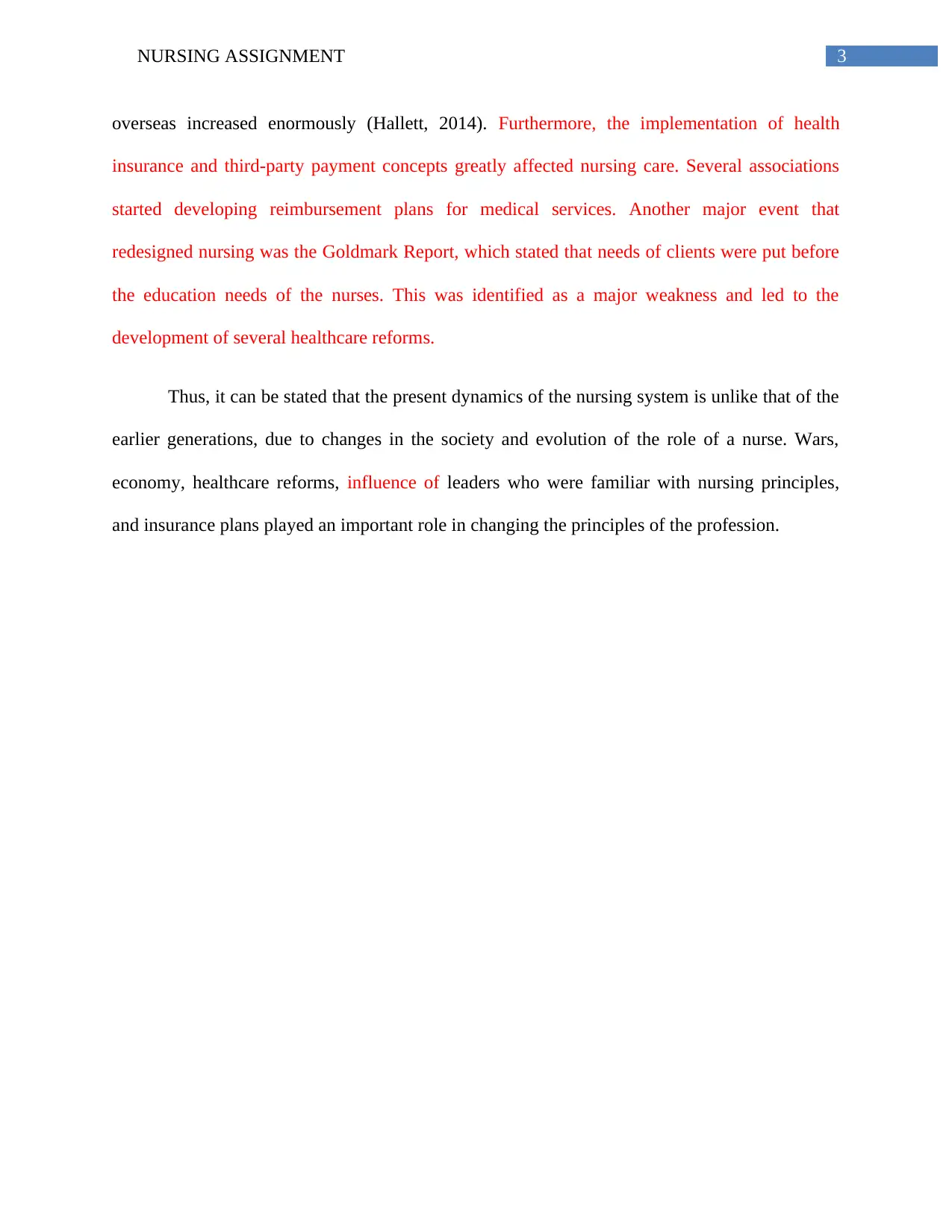
3NURSING ASSIGNMENT
overseas increased enormously (Hallett, 2014). Furthermore, the implementation of health
insurance and third-party payment concepts greatly affected nursing care. Several associations
started developing reimbursement plans for medical services. Another major event that
redesigned nursing was the Goldmark Report, which stated that needs of clients were put before
the education needs of the nurses. This was identified as a major weakness and led to the
development of several healthcare reforms.
Thus, it can be stated that the present dynamics of the nursing system is unlike that of the
earlier generations, due to changes in the society and evolution of the role of a nurse. Wars,
economy, healthcare reforms, influence of leaders who were familiar with nursing principles,
and insurance plans played an important role in changing the principles of the profession.
overseas increased enormously (Hallett, 2014). Furthermore, the implementation of health
insurance and third-party payment concepts greatly affected nursing care. Several associations
started developing reimbursement plans for medical services. Another major event that
redesigned nursing was the Goldmark Report, which stated that needs of clients were put before
the education needs of the nurses. This was identified as a major weakness and led to the
development of several healthcare reforms.
Thus, it can be stated that the present dynamics of the nursing system is unlike that of the
earlier generations, due to changes in the society and evolution of the role of a nurse. Wars,
economy, healthcare reforms, influence of leaders who were familiar with nursing principles,
and insurance plans played an important role in changing the principles of the profession.
Paraphrase This Document
Need a fresh take? Get an instant paraphrase of this document with our AI Paraphraser
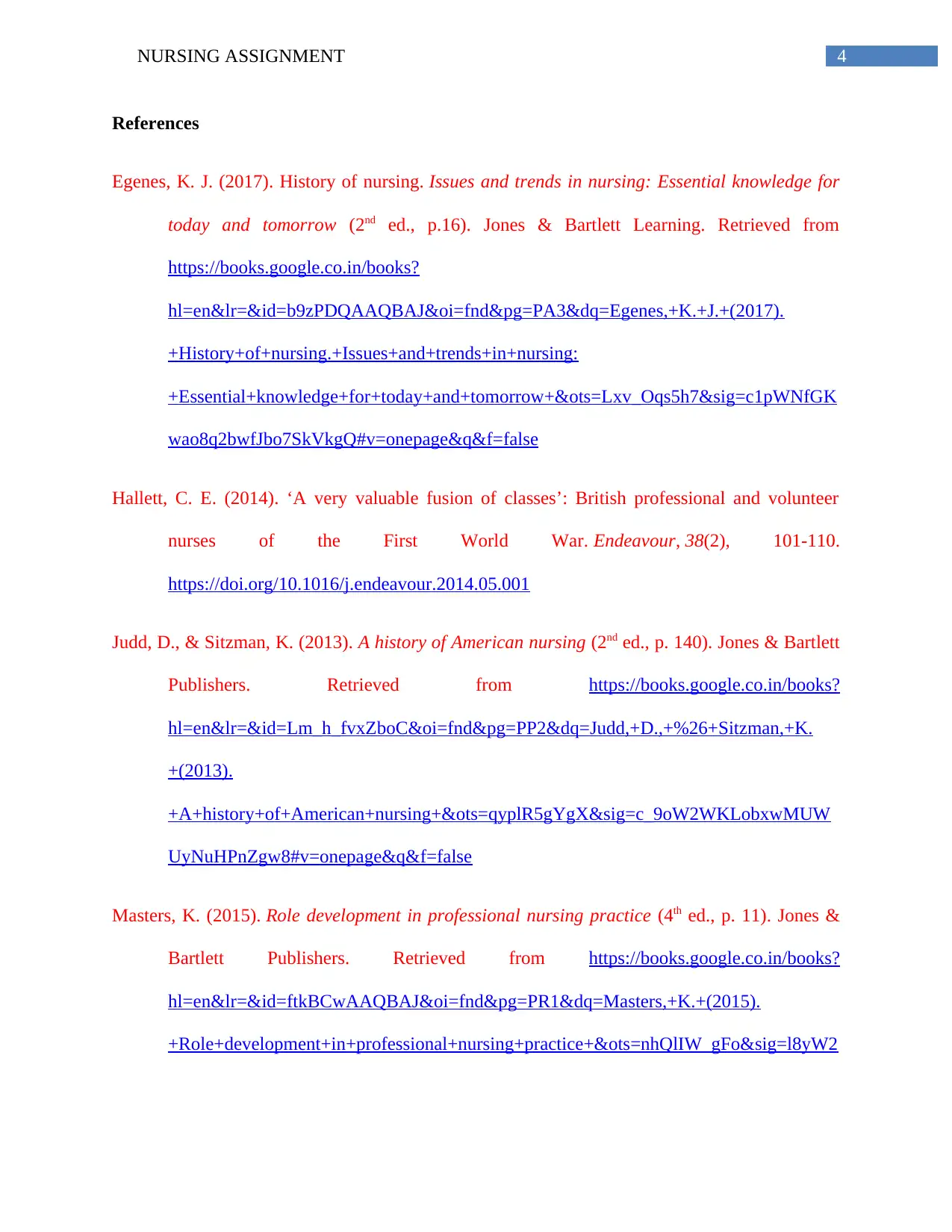
4NURSING ASSIGNMENT
References
Egenes, K. J. (2017). History of nursing. Issues and trends in nursing: Essential knowledge for
today and tomorrow (2nd ed., p.16). Jones & Bartlett Learning. Retrieved from
https://books.google.co.in/books?
hl=en&lr=&id=b9zPDQAAQBAJ&oi=fnd&pg=PA3&dq=Egenes,+K.+J.+(2017).
+History+of+nursing.+Issues+and+trends+in+nursing:
+Essential+knowledge+for+today+and+tomorrow+&ots=Lxv_Oqs5h7&sig=c1pWNfGK
wao8q2bwfJbo7SkVkgQ#v=onepage&q&f=false
Hallett, C. E. (2014). ‘A very valuable fusion of classes’: British professional and volunteer
nurses of the First World War. Endeavour, 38(2), 101-110.
https://doi.org/10.1016/j.endeavour.2014.05.001
Judd, D., & Sitzman, K. (2013). A history of American nursing (2nd ed., p. 140). Jones & Bartlett
Publishers. Retrieved from https://books.google.co.in/books?
hl=en&lr=&id=Lm_h_fvxZboC&oi=fnd&pg=PP2&dq=Judd,+D.,+%26+Sitzman,+K.
+(2013).
+A+history+of+American+nursing+&ots=qyplR5gYgX&sig=c_9oW2WKLobxwMUW
UyNuHPnZgw8#v=onepage&q&f=false
Masters, K. (2015). Role development in professional nursing practice (4th ed., p. 11). Jones &
Bartlett Publishers. Retrieved from https://books.google.co.in/books?
hl=en&lr=&id=ftkBCwAAQBAJ&oi=fnd&pg=PR1&dq=Masters,+K.+(2015).
+Role+development+in+professional+nursing+practice+&ots=nhQlIW_gFo&sig=l8yW2
References
Egenes, K. J. (2017). History of nursing. Issues and trends in nursing: Essential knowledge for
today and tomorrow (2nd ed., p.16). Jones & Bartlett Learning. Retrieved from
https://books.google.co.in/books?
hl=en&lr=&id=b9zPDQAAQBAJ&oi=fnd&pg=PA3&dq=Egenes,+K.+J.+(2017).
+History+of+nursing.+Issues+and+trends+in+nursing:
+Essential+knowledge+for+today+and+tomorrow+&ots=Lxv_Oqs5h7&sig=c1pWNfGK
wao8q2bwfJbo7SkVkgQ#v=onepage&q&f=false
Hallett, C. E. (2014). ‘A very valuable fusion of classes’: British professional and volunteer
nurses of the First World War. Endeavour, 38(2), 101-110.
https://doi.org/10.1016/j.endeavour.2014.05.001
Judd, D., & Sitzman, K. (2013). A history of American nursing (2nd ed., p. 140). Jones & Bartlett
Publishers. Retrieved from https://books.google.co.in/books?
hl=en&lr=&id=Lm_h_fvxZboC&oi=fnd&pg=PP2&dq=Judd,+D.,+%26+Sitzman,+K.
+(2013).
+A+history+of+American+nursing+&ots=qyplR5gYgX&sig=c_9oW2WKLobxwMUW
UyNuHPnZgw8#v=onepage&q&f=false
Masters, K. (2015). Role development in professional nursing practice (4th ed., p. 11). Jones &
Bartlett Publishers. Retrieved from https://books.google.co.in/books?
hl=en&lr=&id=ftkBCwAAQBAJ&oi=fnd&pg=PR1&dq=Masters,+K.+(2015).
+Role+development+in+professional+nursing+practice+&ots=nhQlIW_gFo&sig=l8yW2
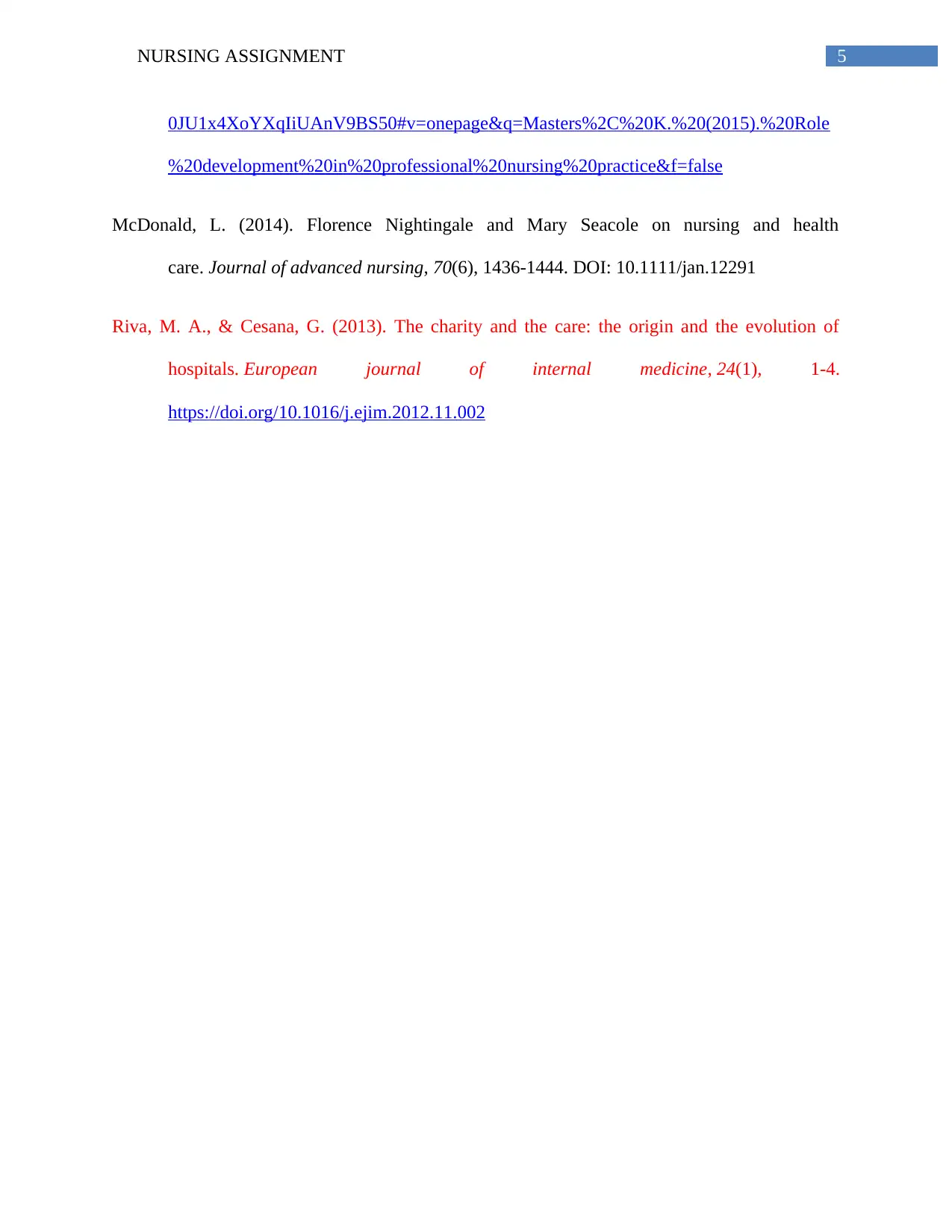
5NURSING ASSIGNMENT
0JU1x4XoYXqIiUAnV9BS50#v=onepage&q=Masters%2C%20K.%20(2015).%20Role
%20development%20in%20professional%20nursing%20practice&f=false
McDonald, L. (2014). Florence Nightingale and Mary Seacole on nursing and health
care. Journal of advanced nursing, 70(6), 1436-1444. DOI: 10.1111/jan.12291
Riva, M. A., & Cesana, G. (2013). The charity and the care: the origin and the evolution of
hospitals. European journal of internal medicine, 24(1), 1-4.
https://doi.org/10.1016/j.ejim.2012.11.002
0JU1x4XoYXqIiUAnV9BS50#v=onepage&q=Masters%2C%20K.%20(2015).%20Role
%20development%20in%20professional%20nursing%20practice&f=false
McDonald, L. (2014). Florence Nightingale and Mary Seacole on nursing and health
care. Journal of advanced nursing, 70(6), 1436-1444. DOI: 10.1111/jan.12291
Riva, M. A., & Cesana, G. (2013). The charity and the care: the origin and the evolution of
hospitals. European journal of internal medicine, 24(1), 1-4.
https://doi.org/10.1016/j.ejim.2012.11.002
⊘ This is a preview!⊘
Do you want full access?
Subscribe today to unlock all pages.

Trusted by 1+ million students worldwide
1 out of 6
Related Documents
Your All-in-One AI-Powered Toolkit for Academic Success.
+13062052269
info@desklib.com
Available 24*7 on WhatsApp / Email
![[object Object]](/_next/static/media/star-bottom.7253800d.svg)
Unlock your academic potential
Copyright © 2020–2026 A2Z Services. All Rights Reserved. Developed and managed by ZUCOL.





